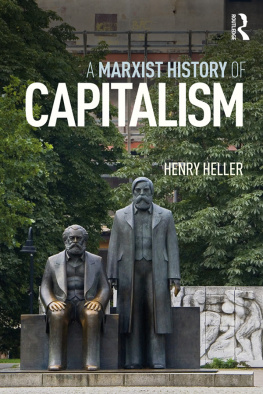Henri Pirenne
THE STAGES IN THE
SOCIAL HISTORY OF CAPITALISM
THE STAGES IN THE SOCIAL HISTORY OF
CAPITALISM
In the pages that follow I wish only to develop a hypothesis. Perhaps after having read them, the reader will find the evidence insufficient. I do not hesitate to recognize that the scarcity of special studies bearing upon my subject, at least for the period since the end of the Middle Ages, is of a nature to discourage more than one cautious spirit. But, on the one hand, I am convinced that every effort at synthesis, however premature it may seem, cannot fail to react usefully on investigations, provided one offers it in all frankness for what it is. And, on the other hand, the kind reception which the ideas here presented received at the International Congress of Historical Studies held at London last April, and the desire which has been expressed to me by scholars of widely differing tendencies to see them in print, have induced me to publish them. Various objections which have been expressed to me, as well as my own subsequent reflections, have caused me to revise and complete on certain points my London address. In the essential features, however, nothing has been changed.
A word first of all to indicate clearly the point of view which characterizes the study. I shall not enter into the question of the formation of capital itself, that is, of the sum total of the goods employed by their possessor to produce more goods at a profit. It is the capitalist alone, the holder of capital, who will hold our attention. My purpose is simply to characterize, for the various epochs of economic history, the nature of this capitalist and to search for his origin. I have observed, in surveying this history from the beginning of the Middle Ages to our own times, a very interesting phenomenon to which, so it seems to me, attention has not yet been sufficiently called. I believe that, for each period into which our economic history may be divided, there is a distinct and separate class of capitalists. In other words, the group of capitalists of a given epoch does not spring from the capitalist group of the preceding epoch. At every change in economic organization we find a breach of continuity. It is as if the capitalists who have up to that time been active, recognize that they are incapable of adapting, themselves to conditions which are evoked by needs hitherto unknown and which call for methods hitherto unemployed. They withdraw from the struggle and become an aristocracy, which if it again plays a part in the course of affairs, does so in a passive manner only, assuming the rle of silent partners. In their place arise new men, courageous and enterprising, who boldly permit themselves to be driven by the wind actually blowing and who know how to trim their sails to take advantage of it, until the day comes when, its direction changing and disconcerting their manoeuvres, they in their turn pause and are distanced by new craft having fresh forces and new directions. In short, the permanence throughout the centuries of a capitalist class, the result of a continuous development and changing itself to suit changing circumstances, is not to be affirmed. On the contrary, there are as many classes of capitalists as there are epochs in economic history. That history does not present itself to the eye of the observer under the guise of an inclined plane; it resembles rather a staircase, every step of which rises abruptly above that which precedes it. We do not find ourselves in the presence of a gentle and regular ascent, but of a series of lifts.
In order to establish the validity of these generalizations it is of course needful to control them by the observation of facts, and the longer the period of time covered the more convincing will the observations be. The economic history of antiquity is still too little known, and its relations to the ages which follow have escaped us too completely, for us to take our point of departure there; but the beginning of the Middle Ages gives us access to a body of material sufficient for our purpose.
But first of all, it is needful to meet a serious objection. If it is in fact true, as seems to be usually conceded since the appearance of Bcher's brilliant Entstehung der Volkswirtschaft Important as all this may be, the weak point in the theory which I am here opposing seems to me to lie especially in a question of method. Bcher and his partizans, in my opinion, have, without sufficient care, used for their picture of the city economy of the Middle Ages the characteristics of the German towns and more particularly the German towns of the fourteenth and fifteenth centuries. Now the great majority of the German towns of that period were far from having attained the degree of development which had been reached by the great communes of northern Italy, of Tuscany, or of the Low Countries. Instead of presenting the classical type of urban economy, they are merely examples of it incompletely developed; they present only certain manifestations; they lack others, and particularly those which belong to the domain of capitalism. Therefore in presenting as true of all the cities of the Middle Ages a theory which rests only on the observation of certain of them, and those the least advanced, one is necessarily doing violence to reality. Bcher's description of Stadtwirtschaft remains a masterpiece of penetration and economic understanding. But it is too restricted. It does not take account of certain elements of the problem, because these elements were not encountered in the narrow circle which the research covered. One may be confident that if, instead of proceeding from the analysis of such towns as Frankfort, this study had considered Florence, Genoa, and Venice, or even Ghent, Bruges, Ypres, Douai, or Tournai, the picture which it furnished us would have been very different. Instead of refusing to see capitalism of any kind in the economic life of the bourgeoisie, the author would have recognized, on the contrary, unmistakable evidences of capitalism. I shall later have occasion to return to this very essential question. But it was indispensable to indicate here the position which I shall take in regard to it.
Of course I do not at all intend to reject en bloc the ideas generally agreed upon concerning the urban economy of the Middle Ages. On the contrary, I believe them to be entirely accurate in their essential elements, and I am persuaded that, in a very large number of cases, I will even say, if you like, in the majority of cases, they provide us with a theory which is completely satisfactory. I am very far from maintaining that capitalism exercised a preponderant influence on the character of economic organization from the twelfth to the fifteenth centuries. I believe that, though it is not right to call this organization "acapitalistic", it is on the other hand correct to consider it "anticapitalistic". But to affirm this is to affirm the existence of capital. That organization recognized the existence of capital since it tried to defend itself against it, since, from the end of the thirteenth century onward, it took more and more measures to escape from its abuses. It is incontestable that, from this period on, it succeeded by legal force in diminishing the rle which capitalism had played up to that time. In fact it is certain, and we shall have occasion to observe it, that the power of capital was much greater during the first part of the urban period of the Middle Ages than during the second. But even in the course of the latter period, if municipal legislation seems more or less completely to have shut it out from local markets, capital succeeded in preserving and in dominating a very considerable portion of economic activity. It is capital which rules in inter-local commerce, which determines the forms of credit, and which, fastening itself on all the industries which produce not for the city market but for exportation, hinders them from being controlled, as the others are, by the minute regulations which in innumerable ways cramp the activity of the craftsmen.













